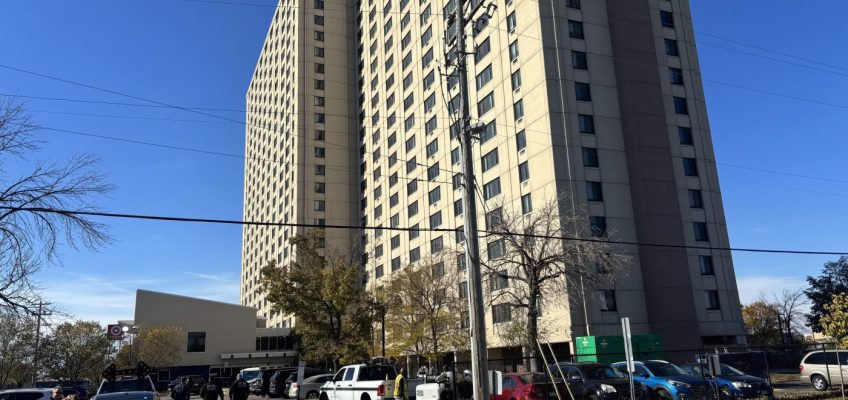Cretin-Derham Hall senior Izaak Johnson threw for seven touchdowns onFriday night and his team needed every one of them to hold off late-charging Mahtomedi 49-44 on the road in the Class 5A, Section 4 championship game at a cold and rainy George Smith Field.
Despite trailing by 13 at halftime, and by as much as 21 in the fourth quarter, the top-seeded Zephyrs managed to cut the gap to as little as six with just under five-and-a-half minutes to play, and to just five in the final minute of play.
But Johnson — who seemed to have a response all night — connected with classmate Sam Heath on a 45-yard touchdown pass with 3:08 to go that helped lift the second-seeded Raiders (7-3) seal their second straight trip to the state tournament.
Mahtomedi — which held off a late Cretin-Derham Hall rally to win 28-27 when the two teams faced off in the regular season on Oct. 10 — finished its season 8-2 overall.
Thompson finished the night 23 of 32 passing for 425 yards.
The Zephyrs began the game with runs of 23 and 24 yards from senior Jacob Reubish, but the drive stalled and they turned the ball over on downs at the Raiders’ 33-yard line.
Two plays later, Johnson connected with junior Owen Welk on a 66-yard touchdown pass to take an early 7-0 lead.
Mahtomedi answered back on its next possession when senior Mark Graff scored on a 1-yard quarterback sneak. The extra point was blocked, though, and the Raiders still led by one.
Johnson insured that margin grew, connecting with senior tight end Isaiah Thom on a 3-yard touchdown pass on the first play of the second quarter.
He struck again one drive later, this time on a 44-yard scoring strike over the middle to junior Dre Frierson-Hollie — a touchdown that put Cretin-Derham Hall up 21-6 with 6:34 to play in the first half.
Mahtomedi found a bit of a spark late in the second quarter. Senior Moseh Mouacheupao picked off a Johnson pass and returned it to his own 49.
The Zephyrs were forced to punt, but succeeded in pinning the Raiders at their own 1. Two plays later, a bad snap resulted in Johnson downing the ball in the end zone for a safety.
That cut the deficit to 21-8 at halftime.
Johnson finished the first half 12 of 17 passing for 199 yards and three touchdowns.
And he picked right up where he left off to start the third quarter, connecting with Ja’Dale Thompson for the first of three second-half touchdown passes to the senior running back.
Mahtomedi cut the gap to 11 when Graff threaded the needle to find junior Jacob Sokoll on a 7-yard touchdown pass with 5:56 to go in the third quarter. The two-point conversion trimmed the Raiders’ lead to 27-16.
But four plays into his team’s next possession, Johnson again connected with Johnson on a 48-yard touchdown pass followed by a two-point conversion.
Reubish scored for the Zephyrs on an 11-yard run early in the fourth quarter, but once more Johnson responded with a touchdown pass to Thompson — this one a 5-yarder that made the score 43-22.
But things were far from over.
The Zephyrs cut the gap to 13 when junior Trevor Rogosheske threw a 45-yard touchdown pass to Graff, who ran for the two-point conversion to make the score 43-30.
Then, after recovering the onside kick, Mahtomedi pulled within six, 43-37, on a 34-yard pass from Graff to junior Luke Torgrude with 5:29 remaining.
And even after Johnson’s touchdown pass to Heath, the Zephyrs didn’t quit. Graff scored on a 22-yard run to trim the lead to just five with 46 seconds to go.
But the Raiders recovered the onside kick to seal the win.
Related Articles
Boys soccer: Como Park comes up short; Blake wins Class 2A title
Class 2A girls soccer: Berger, Aflakpi ‘steal’ championship for Mahtomedi
Girls state soccer: Stillwater rallies from two-goal deficit to win Class 3A state title
High School Football: Section final predictions
Girls state soccer: Mahtomedi propelled back to title game




